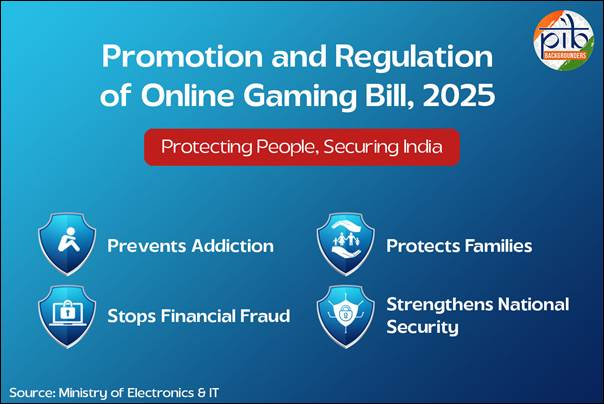
- The legislation places India in line with global regulatory trends seen in China, Singapore, the UK, and Australia, while attempting to balance social safeguards with the growth potential of a $3 billion industry.
- The Promotion and Regulation of Online Gaming Bill, 2025, bans betting, wagering games nationwide while allowing non-monetary, skill-based games under strict oversight.
- The law has already caused major industry exits, with Flutter Entertainment shutting down its real-money operations in India and concerns that more firms may follow due to high compliance costs.
- The law was necessary to protect minors, curb predatory practices, and address rising cases of gambling addiction, indebtedness, and suicides linked to online betting.
India’s Parliament has finally reined in the unchecked spread of online gaming and betting by passing the Promotion and Regulation of Online Gaming Bill, 2025. The legislation comes as a long-overdue measure to curb the predatory practices of real-money gaming platforms that thrived on exploiting users, often pushing them into addiction and debt. Far from being the “sunrise sector” it was once celebrated as, the industry is now facing its reckoning. Flutter Entertainment, one of the largest global gaming companies, has already announced it will shut down operations in India, calling the new rules “unsustainable.” To many observers, however, this exit is less a loss than a necessary correction.
For years, India’s rapid smartphone penetration and cheap data provided fertile ground for the explosive growth of betting apps and real-money gaming. But behind the glossy marketing campaigns, the darker side of this boom became evident. Fantasy sports, rummy, poker, and online betting were increasingly linked to rising indebtedness, family distress, and even suicides. Critics repeatedly warned that the industry was profiting from addiction while hiding behind the label of “entertainment.” Several states, including Tamil Nadu, Andhra Pradesh, and Telangana, had already tried to restrict or ban these platforms, but gaming companies exploited legal loopholes and fought bans in the courts.
The Union government’s intervention through this law is the first decisive, nationwide step to close those loopholes. The legislation draws a clear line: any online game involving betting or wagering is prohibited. Non-monetary, skill-based games may continue but under stricter government oversight, including mandatory registration, age-gating mechanisms, and explicit risk disclosures. Data protection norms further prevent companies from exploiting sensitive personal information for profit. The intent is unambiguous — to prevent predatory platforms from masquerading as harmless entertainment while ensnaring millions of vulnerable users.
Unsurprisingly, the industry fallout has been immediate. Celebrity endorsers, from cricket players to film stars, who once lent credibility to these gambling products now face a loss of revenue streams. Flutter Entertainment’s exit, rather than a tragedy, illustrates the hollowness of a business model built on exploiting loopholes and user vulnerability. Experts warn more exits are likely, but for many, that is a price worth paying to protect India’s youth from becoming collateral in a profit-driven game.
Supporters of the law have pointed to heartbreaking human costs, young players taking their own lives after mounting losses, families being pushed into debt traps, and minors exposed to the false glamour of gambling. In Parliament, MPs condemned the unchecked proliferation of betting platforms, with one likening the trend to “digital opium” devouring the aspirations of the young. The industry’s attempts to frame itself as “innovation” ring hollow when set against these tragedies.

Globally, India is not alone. China and Singapore have imposed strict limits on online gaming, while countries like the UK and Australia continue to grapple with the social costs of online betting. By passing this legislation, India has signalled that it values public health, social stability, and financial transparency over the short-term profits of gaming multinationals.
The government is aware that tax revenues, already impacted by the steep 28% GST imposed in 2023, may dip further in the short term. Yet policymakers insist the long-term benefits of shielding citizens from exploitation, preventing addiction, and fostering a healthier digital ecosystem far outweigh immediate fiscal losses. The online gaming industry may call this overreach; ordinary families will see it as protection long overdue.
The coming years will test the balance between regulation and innovation, but the core message of the law is clear: India will not allow its digital future to be dictated by industries that thrive on addiction and financial ruin. This legislation marks a turning point, putting the long-term interests of the people before profits.
References:
- https://www.reuters.com/world/india/india-passes-bill-ban-money-based-online-games-app-shutdowns-loom-2025-08-21/
- https://m.economictimes.com/tech/technology/nod-for-blanket-ban-on-online-money-games/articleshow/123395007.cms?utm_
- https://timesofindia.indiatimes.com/technology/tech-news/online-gaming-bill-2025-what-happens-to-wallet-money-dream11-mpl-pokerbaazi-zupee-and-others-outline-withdrawal-process/articleshow/123501502.cms?utm_
Samarth Tripathi holds a B.Sc. in Mathematics from Saint Gahira Guru University, Ambikapur, and a B.Ed. He has a strong interest in defence journalism, national security, and geopolitics.
